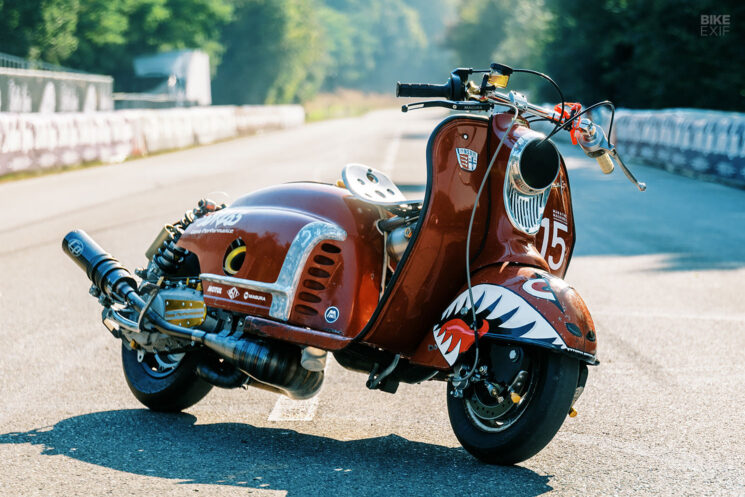
Popularized by events like the Glemseck 101, 1/8th-mile drag racing has given European custom builders a whole new arena to showcase their skills. And with myriad classifications housed within multiple annual events, just about anything goes.
Typical fare at these events includes big bore machines with extended wheelbases, rigid frames, nitrous oxide, and turbo- and superchargers. Hopped-up scooters from defunct German manufacturers—like this 1959 NSU Prima 3—are a rarer breed.
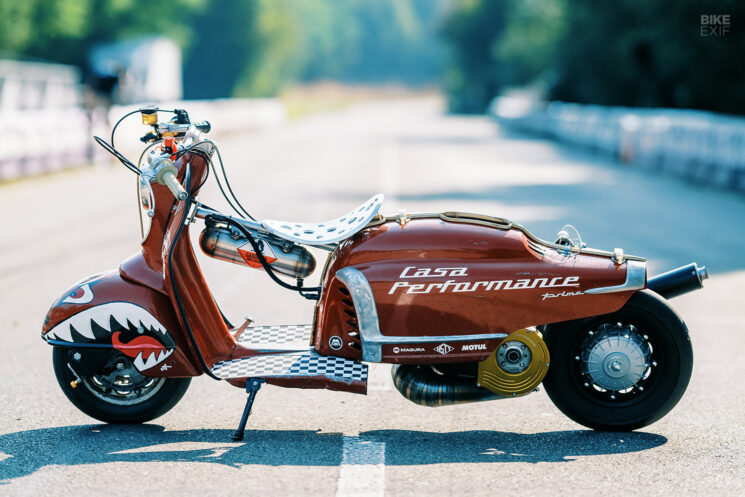
The scoot belongs to and was customized by Krzysztof Szews. An automotive designer by trade, he’s the man behind the custom motorcycle workshop Man and the Machines and one-half of Renstall Moto. He’s also a co-founder of the Rocket Race Club—one of the leagues on the European sprint racing scene.
Rocket Race Club added a scooter class to their race series last year after being approached by an organization of German vintage scooter racing enthusiasts. The inaugural race happened at the Glemseck 101, to the huge delight of the attending masses.
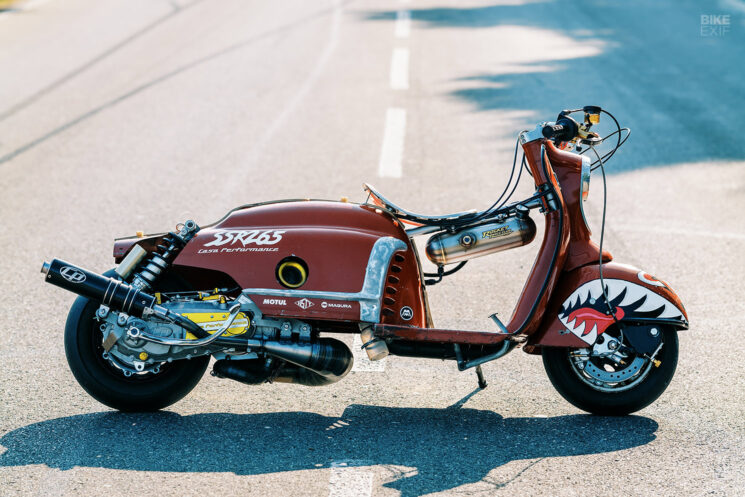
“The crowds were ecstatic, to say the least,” Kris tells us. “Up until then, a scooter was perceived as something very old and slow to get you to the ice cream place at its best. Nobody was expecting this level of noise and speed from these old machines, and such passion and dedication from their builders.”
Kris gets it, since he’s been riding and tuning vintage scooters since the age of 16. So, for this season, he figured that he should throw his hat in the ring with his very own racing scooter.
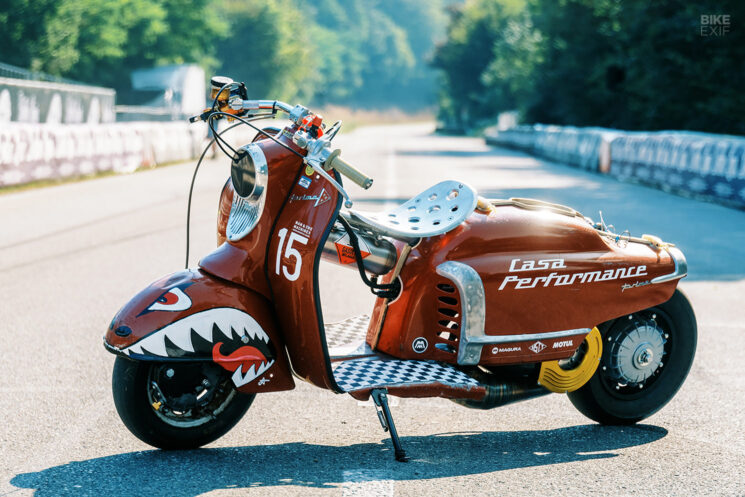
“I initially wanted to use my Series 3 Li 150 Lambretta as a base,” he says. “I had only recently resto-modded it and was hesitant to rip it apart again. I started to draw out the project anyway, when I accidentally stumbled upon a classified ad of an NSU Prima 3 from 1959.”
NSU was once a prolific marque with multiple land speed records to its name. In the early 50s, they built Lambretta scooters under license in their factory in Neckarsulm, north of Stuttgart. When the license ran out, they switched to building their own version of the Lambretta designs—renaming them the Prima 3 and Prima 5.
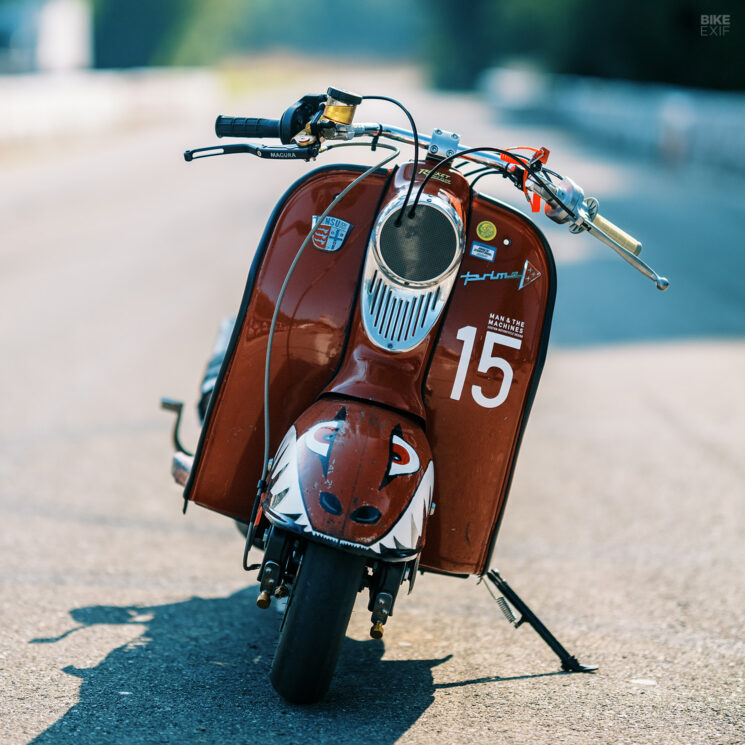
“Despite my extensive history with vintage scooters, I had never seen one before,” Kris adds. “I fell in love with the shape—but even more with the fact that it is super rare, and nobody will have ever been silly enough to build a race bike out of one.”
“The scooter I bought was completely dismantled for restoration and not too far from my house. My research showed that the construction of the NSU Prima is fairly similar to a Lambretta, so I thought that I should be able to retrofit a Lambretta fork and engine and make use of the large spectrum of Lambretta tuning parts available. I ended up buying it and knew from the start that all I was going to keep was the frame and parts of the bodywork—everything else would either be off a Lambretta or fabricated.”
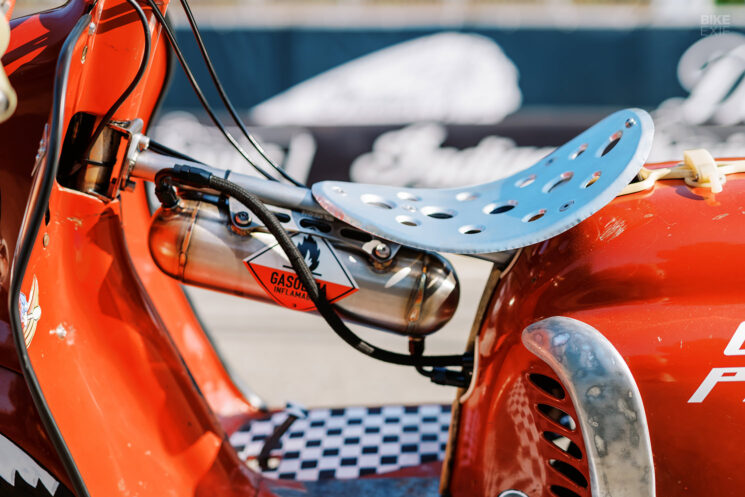
Since Kris was going up against experienced scooter-racing madmen, he knew he would have to pull out all the stops. His checklist was extensive and included stretching the wheelbase, lowering the center of gravity, and redistributing the scoot’s weight to keep the front end planted on takeoff.
To this end, one of Kris’ first mods was to move the fuel forward. It now sits in a stainless steel fuel tank between the rider’s legs, rubber-mounted to a custom-made frame brace. A welded-in brass sight glass helps to keep an eye on the fuel level between runs since the tank only holds 2.5 liters [0.66 gallons].
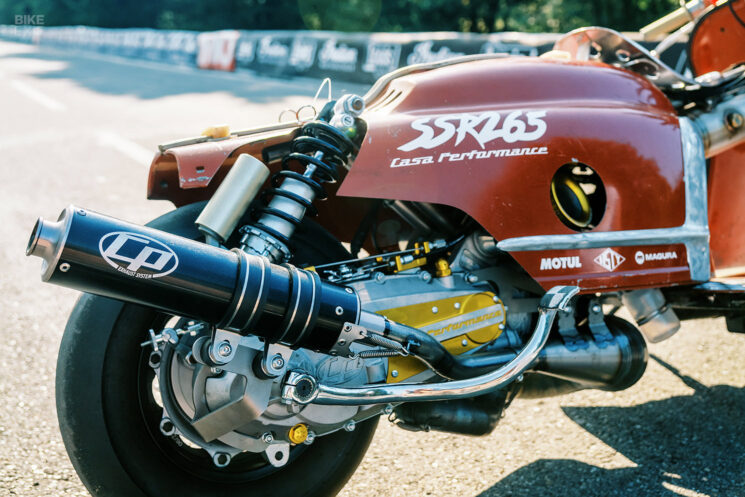
In the meantime, the NSU’s engine (which is good for 7 hp in stock form) went off to a friend for a major upgrade. It came back with a Casa Performance billet aluminum engine casing, prototype cylinder, and performance crankshaft, tweaked to the tune of 56 hp. The exhaust, clutch, and transmission are all Casa items, while the fuel pump and carb are Dell’Orto parts.
With the rebuilt engine in hand, Kris had two tasks ahead of him; mate it to the NSU frame and somehow extend the wheelbase. To kill two birds with one stone, he trimmed the back of the original frame and built a new engine ‘subframe’ to push the motor further back, effectively adding 210 mm to the wheelbase. An extra brace, welded directly to the original frame, offers a stable place to mount the modified Yamaha R1 rear shock.
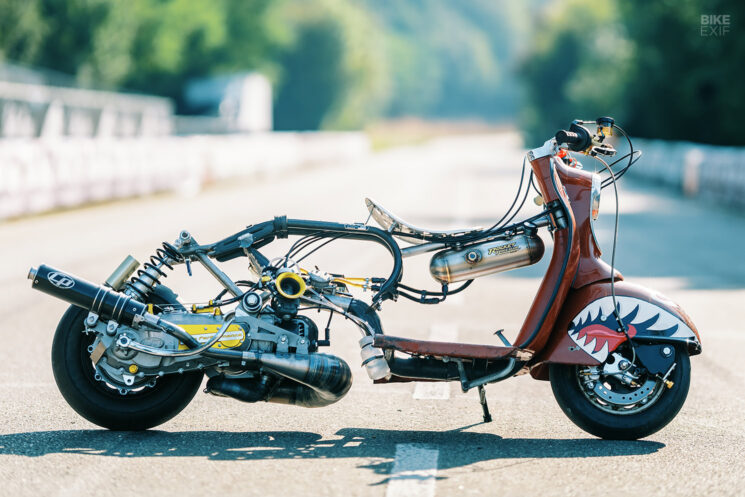
The work also involved de-tabbing the frame and trimming back the original bodywork in several places. Kris wanted to maintain as much of the original patina as possible, so he took extra care in how to cut the bodywork.
Moving to the front, Kris ditched the NSU forks in favor of a Lambretta Series 3 setup. The scooter’s head tube and headset bearings had to be modified, and the fork legs and springs were shortened to slam the front end and limit suspension travel. Kris also engineered a set of adjusters to set the suspension height and spring preload, and modified the original steering stop.
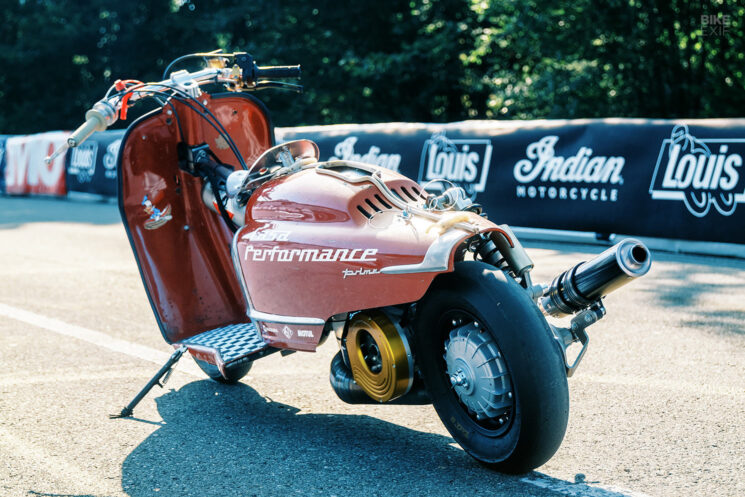
Kris’ super-scooter rolls on a classic 10” Lambretta front wheel, while the 10” real wheel comes from the massive German scooter tuning outlet, SIP Scootershop. Both hoops are wrapped in racing slicks from PMT Tyres in Italy. Kris also updated the front wheel with a disc brake, using a Magura HC3 master cylinder and a braided stainless steel line.
The cockpit uses a mountain bike stem to hold a set of modified bars with modified clip-ons on the ends of them. The throttle is from Magura, and the handlebar-mounted gear shifter is from MB Scooters. Kris built the drilled aluminum seat pan by hand, and added some bite to the floor boards, brake pedal, and kick starter by coating them in skateboard grip tape.
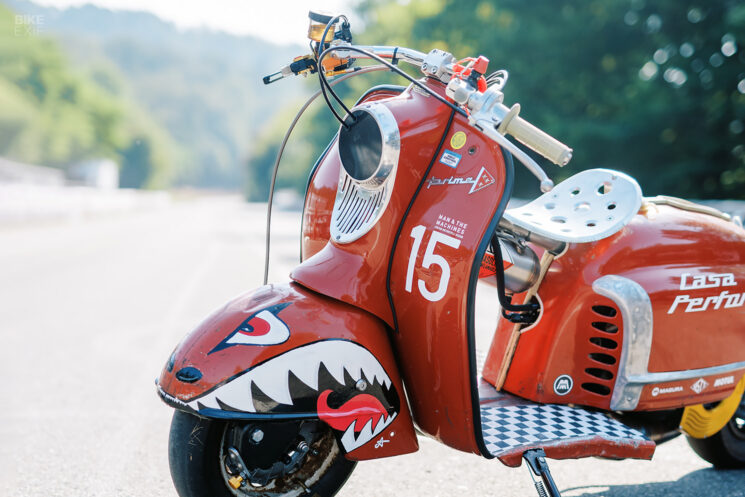
As a nod to the rare NSU’s origins, Kris left its 65-year-old red paint job alone. The only additions are a set of decals to thank his sponsors, and a very special adornment at the front.
“The dragon on the fender was inspired by WW2 airplane nose art,” he tells us. “It was designed and painted by my 11-year-old daughter, Ava. She spent around three days laying it out, pre-drawing everything with pencil, and used pin-striping paint to do the final coloring.”
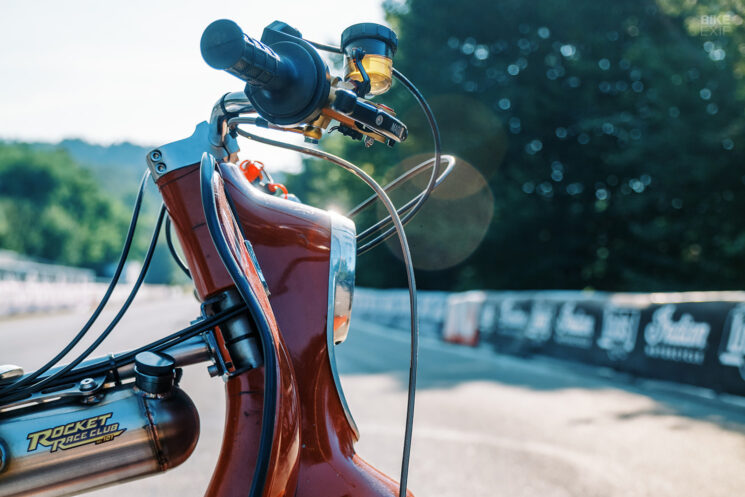
Working under the rule of “form follows deadline,” Kris managed to button the NSU up just in time for this year’s Glemseck 101 event. As a rookie, he didn’t rack up too many wins—but he did walk away with the ‘Best Style’ trophy, which he counts as a big win. He’s also relieved that the scoot performed as intended…
“Having never built a dedicated race machine with such an insane power-to-weight ratio and such heavy changes to the frame geometry, I had no idea if this thing was even going to drive in a straight line, if it would wheelie, spin the rear wheel, or do anything else unexpected. A few improvements are planned for next year’s season, but all in all the machine works great!”
Man And The Machines | Facebook | Instagram | Images by, and with thanks to, Marc Holstein and Christine Gabler
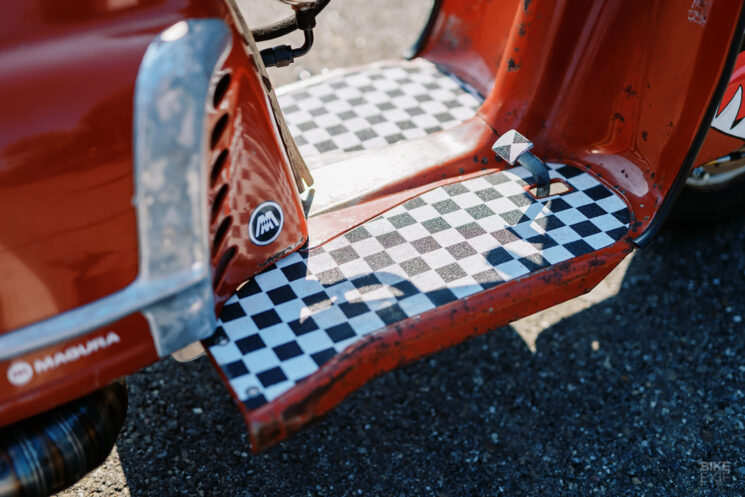
Kris would like to thank Micky and Lorenzo at Casa Performance, Magura, Jesco Schmidt and André Jueterbock at SIP Scootershop, Falco Engelfried, Sebastian Neumann, and the very special engine builder who became a friend and prefers to stay incognito.
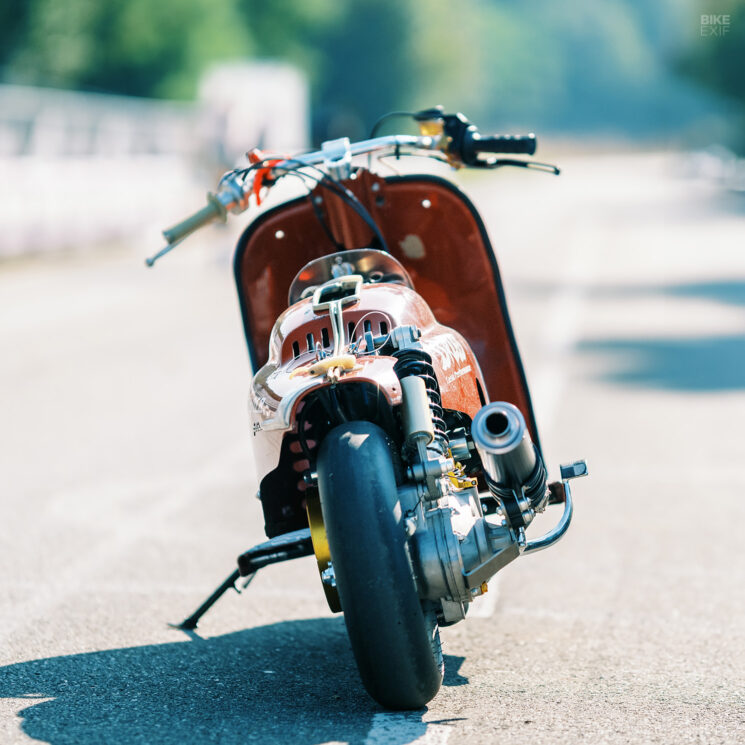
from Bike EXIF https://ift.tt/UYbdinc
No comments:
Post a Comment